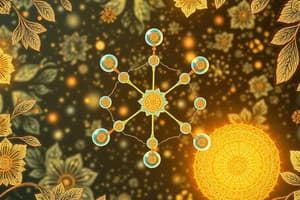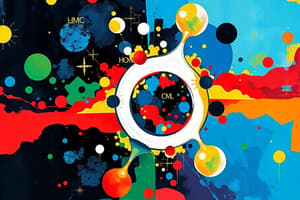Podcast
Questions and Answers
An ionic bond is formed between a _____________ and a _____________?
An ionic bond is formed between a _____________ and a _____________?
metal and nonmetal
In an ionic bond, electrons are ____________ from one another?
In an ionic bond, electrons are ____________ from one another?
transferred
_________ forms from the attractions between oppositely charged ions?
_________ forms from the attractions between oppositely charged ions?
ionic bond
The attractive force between oppositely charged ions which form when electrons are transferred from one atom to another is a ___________?
The attractive force between oppositely charged ions which form when electrons are transferred from one atom to another is a ___________?
Every ionic compound is a ____________?
Every ionic compound is a ____________?
If ionic compounds are ________ or ________ they conduct ________?
If ionic compounds are ________ or ________ they conduct ________?
All ________ are made of ionic compounds?
All ________ are made of ionic compounds?
Generally, atoms join to form bonds so that each atom has __________ ___________ ______________?
Generally, atoms join to form bonds so that each atom has __________ ___________ ______________?
What are the two kinds of chemical bonding?
What are the two kinds of chemical bonding?
_______ atoms tend to form ionic bonds when one has more __________ for ___________ than the other?
_______ atoms tend to form ionic bonds when one has more __________ for ___________ than the other?
A _________ _________ is the smallest ratio of ions in ionic compounds?
A _________ _________ is the smallest ratio of ions in ionic compounds?
Generally, atoms join to form bonds so that each atom has a stable electron configuration?
Generally, atoms join to form bonds so that each atom has a stable electron configuration?
What is the structure of ionic bonds?
What is the structure of ionic bonds?
What is the valence electrons in ionic bonds?
What is the valence electrons in ionic bonds?
What state are ionic bonds at room temperature?
What state are ionic bonds at room temperature?
What is the melting and boiling points of ionic compounds?
What is the melting and boiling points of ionic compounds?
Ionic bonds are formed from the _______ ______ _________?
Ionic bonds are formed from the _______ ______ _________?
Ionic compounds are in the form of _________ NOT _______?
Ionic compounds are in the form of _________ NOT _______?
Flashcards are hidden until you start studying
Study Notes
Ionic Bonds Overview
- An ionic bond is established between a metal and a nonmetal through the transfer of electrons.
- These bonds form due to attractions between oppositely charged ions resulting from electron transfers.
Structure and Properties of Ionic Compounds
- Ionic compounds exist as solids in their natural state.
- When ionic compounds are dissolved in water or melted, they can conduct electricity due to the movement of ions.
- Ionic bonds create a network structure, where ions are arranged in a repeating pattern.
Bond Formation
- Atoms bond to achieve a stable electron configuration, meaning a complete outer shell of electrons.
- There are two primary types of chemical bonding: ionic and covalent.
- Ionic bonds typically occur when one atom has a greater attraction for electrons than another, leading to the transfer of electrons.
Characteristics of Ionic Compounds
- The smallest ratio of ions in an ionic compound is known as a formula unit.
- Ionic compounds generally have high melting and boiling points due to the strong attractions between ions.
- In room temperature conditions, ionic compounds remain solid.
Summary of Ionic Bond Features
- The valence electrons involved in ionic bonds are transferred from one atom to another, leading to ion formation.
- All substances can be made from ionic compounds, emphasizing the prevalence of these bonds in various materials.
- Ionic compounds are fundamentally networks rather than individual molecules, contributing to their unique properties.
Studying That Suits You
Use AI to generate personalized quizzes and flashcards to suit your learning preferences.



